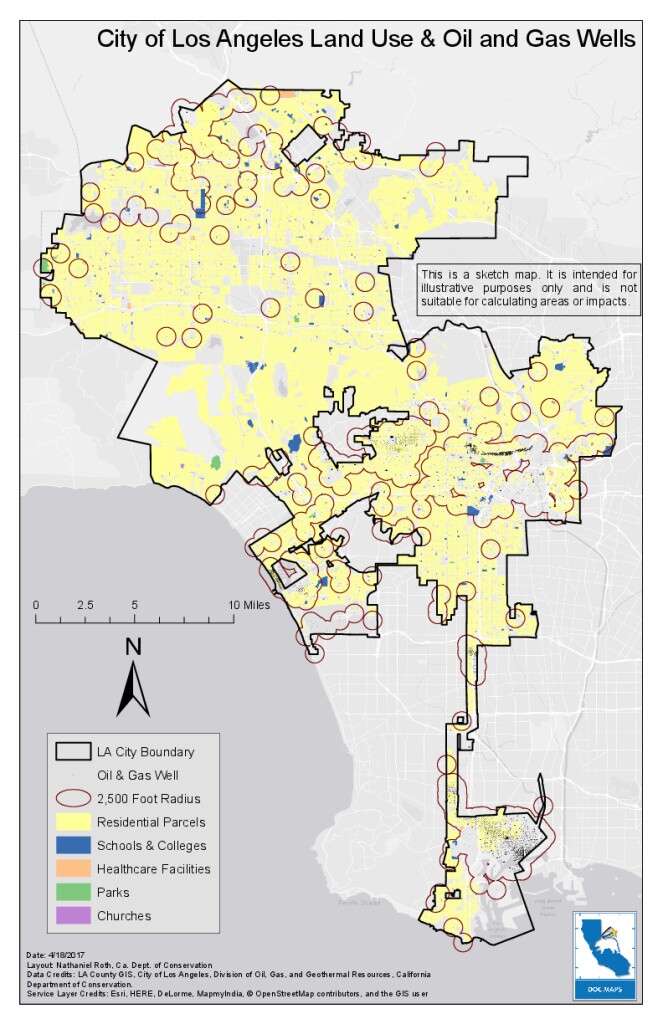This story is free to read because readers choose to support LAist. If you find value in independent local reporting, make a donation to power our newsroom today.
This archival content was originally written for and published on KPCC.org. Keep in mind that links and images may no longer work — and references may be outdated.
LA to study costs, health benefits of phasing out oil drilling
The City of Los Angeles is moving ahead with a study of the public health benefits and economic consequences of phasing out oil and gas development around homes, schools, hospitals, and other public places.
Following Friday’s vote, the city’s Petroleum Administrator and LA County Department of Public Health have 120 days to report back.
For years, residents of South LA and Wilmington have been complaining of health problems that they claim are due to the chemical emissions associated with oil extraction.
In April, city council president Herb Wesson called for a study of the health impacts of living alongside oil wells, saying he had gotten tired of listening to the same complaints year after year, “and figured it was time for action.”
“The number one goal is to make sure we keep the people in our community safe,” he said at the time.
Sylvia Arredondo, a member of the Wilmington Neighborhood Council and organizer with Communities for a Better Environment (CBE), said even though the study is just that – a study – she’s optimistic it will result in real change.
“I am feeling very optimistic because of the community pressure being put on our city council members,” she said.
Indeed, environmental justice groups have been remarkably successful recently at raising the profile of issues surrounding LA’s urban oilfield. In 2015, CBE and other groups sued the city of LA for inequitable permitting of oil and gas cites that they said disadvantaged low-income communities of color. The lawsuit resulted in new permitting guidelines within the city.
In February, the The New York Times editorial board wrote about the negative health effects of oil development in LA. “Wells on the city’s wealthier west side tend to be farther away from homes and are more likely to be enclosed to reduce pollution,” the newspaper noted.
And celebrities like Mark Ruffalo regularly re-tweet a barely three-year old environmental justice coalition called STAND-LA, which focuses on shutting down urban drilling.
Today, #WeSTAND for the health of Angelenos as @LACityCouncil votes on the motion to study the health impacts of neighborhood #OilDrilling.
— Mark Ruffalo (@MarkRuffalo) June 30, 2017
Wesson’s original motion called for studying the feasibility of creating a buffer zone, or setback, around places where people live and gather. Inside the buffer zone, no oil and gas development would be allowed. His motion did not specify how big the buffer zone would be. Activists are hoping for 2,500 feet, a distance that the California Department of Oil Gas and Geothermal Resources estimated could cause 90 percent of the city’s 322 active oil wells to be shut down.

Wesson’s motion also asked staff to study how, legally, to stop oil production of existing wells and compensate companies.
Since April, a council committee has weighed in on the motion and made a number of changes.
Councilmember Mitch Englander asked staff to consider the oil industry’s concerns: job loss, the city’s legal authority and likelihood of getting sued. He also wanted an analysis of the environmental and human rights records of other oil-producing nations that California may have to rely more heavily on if production is curtailed in Los Angeles.
While the oil industry does not oppose the study, Sabrina Lockhart, a spokeswoman with the California Independent Petroleum Association, said phasing out oil in LA is shortsighted.
“The less oil we produce here under the strictest standards in the nation means we have to obtain the rest of our energy from imports that don’t follow the same environmental protections that we have here,” Lockhart told KPCC in April.
Councilmember David Ryu weighed in on behalf of community activists, asking staff to study health impacts at drilling sites and closely examine the city’s authority to regulate the kinds of chemicals and materials oil companies use.
Arredondo said that lower-income communities of color are increasingly becoming leaders of the climate change movement in California.
“Now more than ever, it’s these communities that are driving the changes we want to see,” she said.
This post was updated at 10:06 am on July 5 with a change to CIPA's view on the oil study.









